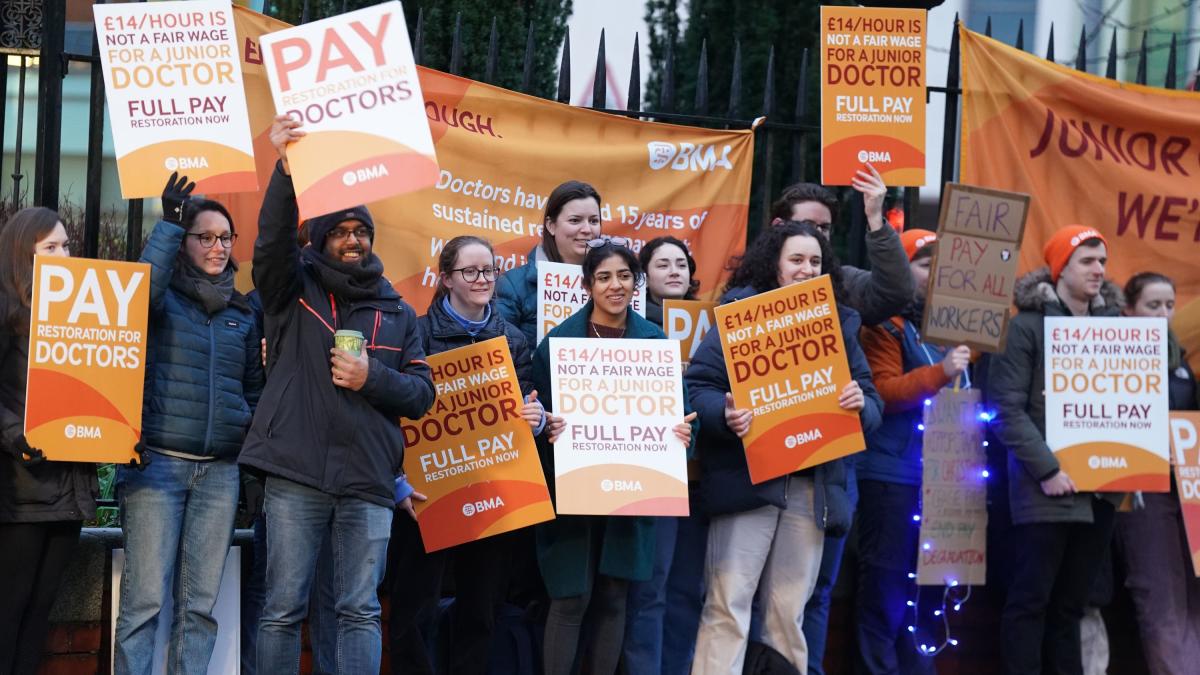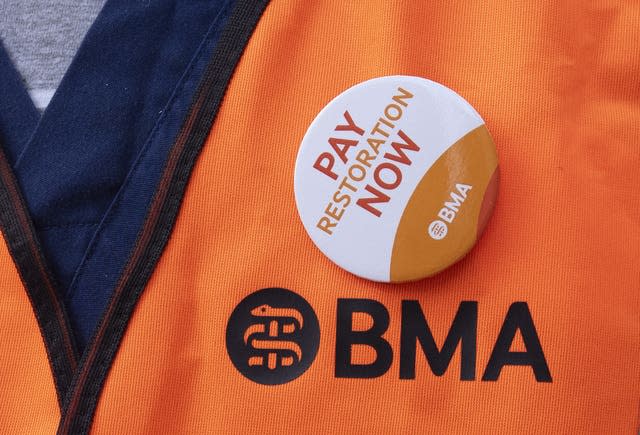Concern over junior doctors’ strike after heatwave

NHS leaders have said the service is expecting “significant disruption” due to the heatwave and junior doctors’ strike.
Yellow heat warnings are in effect in many parts of the country, ending at 5 a.m. Thursday, just two hours before residents across the country put down their stethoscopes and pick up their signs.
This is the eleventh strike by young doctors of the British Medical Association (BMA) in England, while the bitter dispute over salaries continues.
The weather will become even more inhospitable during the five-day strike, but NHS bosses said the current heatwave was already putting pressure on the service.
Concerns have also been raised about the impact of the strike on hospitals affected by the cyberattack.
The major hospitals Guys’ and St. Thomas’ and King’s in London are still operating at reduced capacity following the incident.
However, the BMA announced that some senior junior doctors would be allowed to work in hospitals during the strike to “prevent dangerous delays in cancer care”.
A post on X said: “To avoid dangerous delays in cancer care, we are granting an exemption to surgical junior doctors treating high-risk upper gastrointestinal, head and neck and lung cancers in three hospital trusts: Lewisham and Greenwich, Guys & St Thomas’ and Kings College Hospital.
“This will help patients who have experienced dangerous delays in their treatment due to the difficulties in defending against unplanned and malicious cyberattacks. We thank NHS England for bringing their concerns to our attention in the interests of patient safety.
“The exemption only applies to junior doctors in upper gastrointestinal, head and neck surgery and lung cancer in the three trusts listed. All other junior doctors, including in these trusts, can and should continue to strike.”
To avoid dangerous delays in cancer care, we are granting an exemption to surgical junior doctors dealing with high-risk cancers of the upper gastrointestinal tract, head and neck and lung in three hospital trusts: Lewisham and Greenwich, Guys & St Thomas’ and Kings College Hospital. 1/3
— The BMA (@TheBMA) 25 June 2024
Asked about the impact of the cyberattack and the weather, BMA Council Chairman Professor Philip Banfield said: “If junior doctors go on strike, it will not result in the hospital running out of doctors. However, the junior doctors’ work will be replaced by more experienced doctors.”
“So you have our SAS colleagues, consultants, a more experienced workforce, these gaps are not quite what you would expect.
“Because of the cyberattack, they (the hospitals) are unable to carry out much of the planned work anyway – and that extends over a period of six weeks.
“So if you fight against it, they already have a mechanism to get the job done that they can handle.
“If you have to go to the emergency room because of the heat during a heatwave warning, you will be treated there just like on any normal day. There will not be a sudden need to bring in a lot of doctors.
“If a (hospital) finds that there is a cluster of incidents that require physicians to return to work, then the residents will return to work.
“So if something big happens at an event like Glastonbury, for example, and countless people end up being hospitalised, what does NHS England do?
“He comes and tells us what the situation is and we say, ‘Fair, you need two people to go back.'”
Commenting on the request for some doctors to continue working during the strike, Professor Banfield added: “Safe patient care has always been a priority for the BMA during industrial action. This has been ensured by giving trusts plenty of notice of planned strike action so that more experienced doctors could step in during the strike period.”
“That’s why we have agreed with NHS England that a limited number of doctors can work at six sites across London where the recent cyberattack has crippled access to life-saving surgery.
“Doctors at Lewisham and Greenwich Hospitals, Guy’s and St Thomas and Kings College Trusts will be caring for patients whose treatment may have suffered dangerous delays as a result of this malicious attack.
“NHS England has raised concerns with us about patient safety in these hospitals and we are pleased that we have been able to reach an agreement that means this group of patients will not face further delays during the strike.”
Earlier this week, the charity Age UK urged people to be considerate of older friends and neighbours as certain medical conditions could worsen during a heatwave.
Despite extensive preparations, NHS England expects the strike to result in “widespread disruption to routine care and difficulties in discharging patients”.
Half of the medical staff are junior doctors, and their last strike in February resulted in the cancellation of 91,048 appointments, treatments and operations.


The strike begins on June 27 at 9 a.m. and ends on July 2, just two days before the elections.
National Medical Director of the National Health Service, Professor Sir Stephen Powis, said: “This new wave of strikes will once again hit the NHS very hard. Almost all routine care is likely to be affected and services will come under significant pressure.”
“Warmer weather may put additional pressure on services at a time when demand for services is already high.
“As always, we are working to ensure that urgent and emergency patient care is prioritised. But there is no doubt that after strikes, getting routine services back on track becomes more difficult each time and the cumulative impact on patients, staff and the NHS as a whole is enormous.”
“People should continue to call 999 for life-threatening emergencies and NHS 111 for other health problems – via the NHS app, online or by phone.
“GP services and pharmacies are also available to patients and can be used as usual. Patients who have not been contacted or informed of the postponement of their scheduled appointment are also urged to attend as usual.”
Junior doctors have said they will end their strike if Prime Minister Rishi Sunak gives a credible promise to restore their salaries.
According to the BMA, salaries of junior doctors have been cut by more than a quarter since 2008.
Matthew Taylor, chief executive of the NHS Confederation, said: “While we fully understand junior doctors’ legitimate complaints about their pay, conditions and training, NHS leaders are nonetheless frustrated that they have to take to the picket line again.”
“Going on strike in the middle of an election campaign, when no political party is able to end the conflict, is a bitter pill to swallow for the staff who have to fill the gaps and for the patients whose appointments have to be cancelled or postponed.
“The BMA should also explain what concessions it will make to organisations and patients affected by the recent serious cyber attacks.
“As both major parties have promised to resume negotiations immediately after a new government is formed, there is no reason for these strikes. We call on the BMA to wait for a new government to be formed and try to find a compromise.”
Caroline Abrahams, charity director at Age UK, said: “At Age UK we are concerned about the risks that strikes pose to the health of older people.
“We know the NHS is under significant pressure and older people really value the care and support they receive from their doctors, but continued industrial action is simply unsustainable for NHS services and patients alike.”
“Older people must not be left alone with pain because appointments and operations are cancelled or postponed and possible illnesses remain undetected.
“Every strike carries a potential risk for patients, among whom the elderly form the largest group.
“There must be an agreement and we call on the next government to make this a priority from the start – in the meantime we call on junior doctors to call off the strike and hold on until then.”
Since the start of the current wave of industrial action in the NHS in December 2022, which has included walkouts by junior doctors, specialists, paramedics, physiotherapists and other staff groups, around 1.5 million appointments have been postponed.
It is estimated that the strikes have cost the NHS around three billion pounds.



